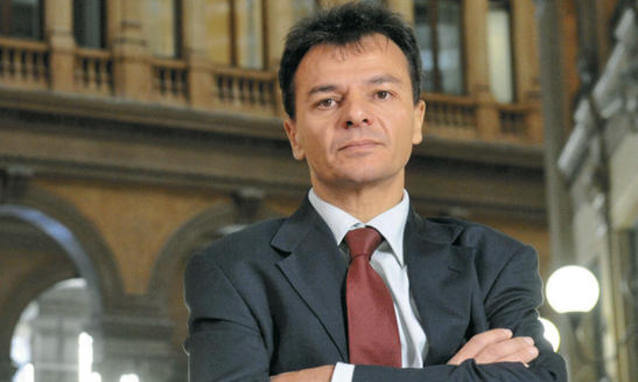Stefano Fassina, MP and former Deputy Finance Minister of Italy, kindly sent me the following opinion piece. While convinced that the “controlled disintegration of the eurozone” that he advocates is pregnant with great dangers, this is a debate that Europeans cannot eschew.
The burning Greek tale has a general political value. Lets start from the content of the Statement of the Euro Summit held on July 12th, before making any political assessments. It is impossible to hide the unsustainability of the provisions from economic and fiscal perspectives. Notwithstanding the adjustments won by the Greek delegation in Brussels, the imposed measures are brutally contractionary, as well as regressive on the social ground.
The macroeconomic compensation measures risk to be basically non-existent. The financing foreseen for the third bailout is devoted to recapitalizing banks and paying debts to the ECB, the IMF and private lenders. Nothing goes to capital expenditure, while the credibility of the European Commission in helping the Greek government mobilize up to €35bn for investments in 3-5 years has to be weighed against its inability to find the minimal resources for the “Juncker Plan”. And finally, the commitment to restructuring the Greece’s public debt opens a perspective that in any event won’t have real effects until 2023, the end of the grace period granted by the European states on their respective loans.
What lessons can we learn from the course of Greece? Alexis Tsipras, Syriza and the Greek people have the undeniable historical merit of having ripped away the veil of Europeanist rhetoric and technical objectivity aimed at covering up the dynamics in the eurozone. We now see the power politics and the social conflict between the financial aristocracy and the middle classes: Germany, incapable of hegemony, dominates the eurozone and pursues an economic order that is functional to its national interest and to those of big finance.
There are two points to be faced here. The first: neo-liberal mercantilism dictated by and centred on Berlin is unsustainable. The devaluation of labour, in alternative to national currency devaluation, as the main route to real adjustments results in a chronic insufficiency of aggregate demand, persistently high unemployment, deflation, and burgeoning public debt. In such a framework, beyond the borders of the dominant nation-state, the euro leads to a hollowing out of democracy, turning politics into administration on behalf of third parties and entertainment.
Is this route reversible? This is the second point. Its hard to answer yes. Unfortunately, the necessary corrections to make the euro sustainable appear to be unfeasible for cultural, historical and political reasons. National public opinions have opposing views and confliting positions, made more distant by the agenda dominating in the eurozone after 2008. The views and positions prevalenting among the Germans are facts. German people deserves respect as any other people. In Germany, like everywhere, democratic principles matter within the only relevant political dimension: the nation-state.
The first two points of analysis lead to a unconfortable truth: We need to acknowledge that the euro was a mistake of political perspective. We need to admit that in the neo-liberal cage of the euro, the left loses its historical function and is dead as a force committed to the dignity and political relevance of labour and to social citizenship as a vehicle of effective democracy. The irrelevance or the connivance of the parties of the European socialist family are manifest. Continuing to invoke, as they do, the United States of Europe or a pro-labour rewrite of the Treaties is a virtual exercise leading to a continuing loss of political credibility.
What should be done? We are at a crossroads of history. On one hand, the path of continuity bound to the euro, that is, acceptance of the end of middle-class democracy and welfare States: a precarious balance of underemployment and social anger, threatened by very high risks of nationalistic and xenophobic rupture. On the other, a shared decision, without unilateral acts, to move beyond the single currency and the connected institutional framework, above all to fix the democratic accountability of monetary policy: a mutual beneficial solution, despite a difficult, uncertain path, with painful consequences at least in the initial period.
Germany has understood this and, still mindful of its history, indicates a way out to avoid a chaotic breakup of the eurozone and uncontrollable nationalistic drifts (already worrisome both among Germans and in their regard): a multilateral agreement to move beyond the single currency, as exemplified in the proposal of “assisted Grexit” written by Finance Minister Schäuble and endorsed by Chancellor Merkel. It implies not abandoning Greece to itself, but “an exit accompanied by haircut of public debt (impossible under the current Treaties) and technical, financial and humanitarian assistance.”
The choice is a dramatic one. The road of continuity is the explicit option of the grand conservative-led coalitions and “socialist” executives (in France and Italy for instance). The road of discontinuity may be the only one for attempting to save the European Union, revitalize the middle-class democracies and reverse the trend of the devaluation of labour. For a managed dis-integration of the single currency, we must build a broad alliance of national liberation fronts, starting from the eurozones Mediterranean periphery, made up of progressive forces open to the cooperation of the democratic right wing sovranist parties. The time available is increasingly short.
Stefano Fassina, Member of Parliament, former Deputy Minister of Finance, Italy











